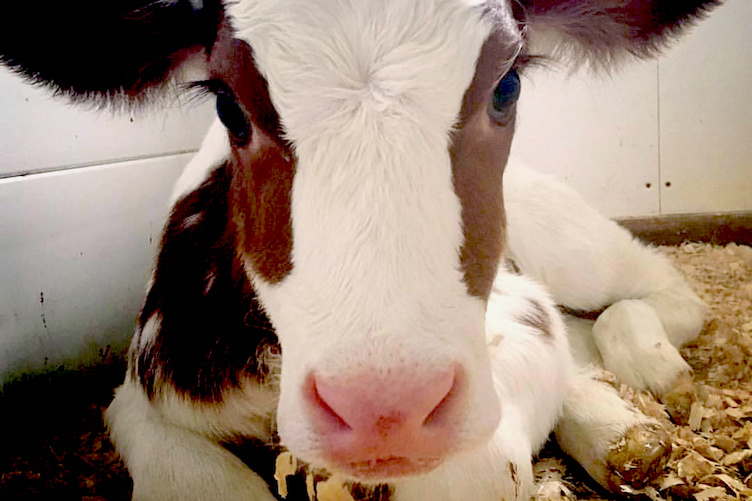
A calf born at the UNH Fairchild Dairy and Teaching Research Center. Calves are the foundation of the herd and are necessary to replace the cows that leave the herd for various reasons.
Feeding pregnant dairy cows the vitamin niacin prior to giving birth improved the quality of their colostrum, which is the first milk calves drink, according to new research from the University of New Hampshire. Colostrum is essential to building the immune systems of calves, and thus, their survival.
“Calves are the foundation of the herd and are necessary to replace the cows that leave the herd for various reasons,” said Peter Erickson, professor of dairy management who conducted the research with Kayla Aragona, a doctoral candidate in animal science. “They also are the third greatest cost for the dairy producer, behind feed and labor, respectively. Reducing health costs and improving growth will result in a better bottom line for the producer.”
“Sixty percent of the colostrum produced in the United States is considered poor quality. Our goal is to provide dairy producers with ways to improve the health of their replacement heifers,” Erickson said of the New Hampshire Agricultural Experiment Station funded research.
"Our goal is to provide dairy producers with ways to improve the health of their replacement heifers."
The United States is home to 51,500 dairy farms and 9 million dairy cows. New Hampshire has approximately 106 licensed dairy farms, according to the NH Dairy Sanitation Inspection & Licensing. The state’s dairy industry impacts state and local economies with more than $141 million in total output and more than $19 million in labor income, according to Granite State Dairy Promotion. Dairy farming also helps support many businesses related to the production of milk such as feed companies, milking equipment suppliers, tractor dealerships and milk processors.
In this study conducted at the experiment station’s Fairchild Dairy Teaching and Research Center, researchers fed 0, 16, 32 or 48 grams of the vitamin niacin to pregnant cows – called dams – each day for four weeks prepartum. Niacin may function in two ways. First, it has been theorized to increase rumen microbial protein production, which results in more protein for the cow. More protein should result in more antibodies produced for use in colostrum. Second, the niacin increases blood flow, resulting in more antibody transport to the udder.
Researchers found that supplemental niacin to dams increased the immunoglobulin G – the main antibody for cattle – concentration and yield when dams were fed niacin for four weeks before calving. In addition, calves fed this colostrum responded by increasing feed efficiency. This suggests that there is a component in colostrum that actually might stimulate intestinal development, resulting in an enhanced uptake of nutrients.
Erickson will present his research findings Feb. 2 at the NH Farm and Forest Expo.
This material is based upon work supported by the NH Agricultural Experiment Station, through joint funding of the National Institute of Food and Agriculture, U.S. Department of Agriculture, under award number 1001283 and multistate project NC2042, and the state of New Hampshire.
-
Written By:
Lori Tyler Gula, PhD | NH Agricultural Experiment Station | lori.gula@unh.edu | 603-862-1452
















































